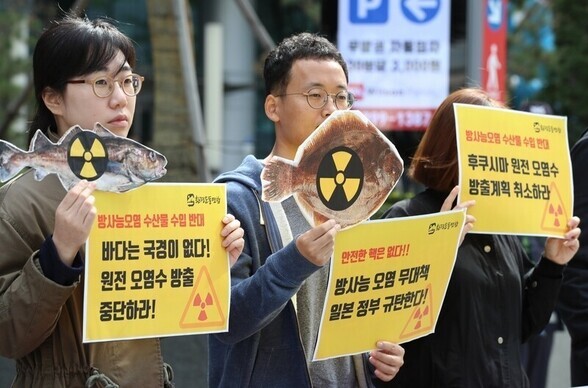hankyoreh
Links to other country sites 다른 나라 사이트 링크
S. Korea, China, international environmental groups protest Japan’s decision to dump Fukushima water into sea

The Japanese government decided Tuesday to release radioactive water from the Fukushima Daiichi Nuclear Power Plant into the ocean, prompting sharp protests from neighboring countries South Korea and China. Nonprofits in Japan that oppose the plan held press conferences in Fukushima and in front of the prime minister’s residence. The international environmental group Greenpeace issued a statement condemning Tokyo’s decision.
The South Korean government conveyed its strong regrets Tuesday to the Japanese government in an emergency meeting of vice ministers of related ministries, including the Ministry of Foreign Affairs, the Ministry of Oceans and Fisheries, and the Nuclear Safety and Security Commission.
The meeting was chaired by Koo Yun-cheol, chief of the Office for Government Policy Coordination, who said, “We will take all necessary measures for the safety of our citizens.”
The South Korean government demanded that Japan transparently release information about the entire process of treating the contaminated water and promised to conduct thorough radiation testing of food imported from Japan.
On the same day, Second Vice Minister of Foreign Affairs Choi Jong-moon summoned Koichi Aiboshi, Japan’s ambassador to South Korea, to the Ministry of Foreign Affairs, where Choi strongly protested Japan’s decision to dump contaminated water from Fukushima.
China also denounced what it called a “unilateral and irresponsible decision” in a statement signed by its foreign ministry spokesperson.
“The ocean is the shared property of mankind, and contaminated water must not be dumped into the ocean without permission,” the statement said.
“We reserve the right to take additional action,” China said, suggesting that if Japan doesn’t retract its decision, China could take countermeasures.
Nonprofits connected with the environment and the nuclear industry have also swung into action.
Sayonara Nuclear Power Plants organized a press conference to protest the Japanese government’s decision in front of the prime minister’s residence in Tokyo. Over 300 people showed up for the press conference, where they urged the Japanese government to listen to locals and fishermen and not to dump the contaminated water into the ocean.
Around 50 people also gathered in front of the Fukushima Prefectural Office for a protest. A banner at the protest said, “Don’t release the contaminated water into the ocean.”
Greenpeace released a statement condemning the decision of the Japanese government to discharge the contaminated water, stating that this decision “completely disregards the human rights and interests of the people in Fukushima, wider Japan and the Asia-Pacific region […] including Korea.”
By Noh Hyun-woong, staff reporter
Please direct comments or questions to [english@hani.co.kr]

Editorial・opinion
![[Editorial] Penalties for airing allegations against Korea’s first lady endanger free press [Editorial] Penalties for airing allegations against Korea’s first lady endanger free press](https://flexible.img.hani.co.kr/flexible/normal/500/300/imgdb/original/2024/0502/1817146398095106.jpg) [Editorial] Penalties for airing allegations against Korea’s first lady endanger free press
[Editorial] Penalties for airing allegations against Korea’s first lady endanger free press![[Editorial] Yoon must halt procurement of SM-3 interceptor missiles [Editorial] Yoon must halt procurement of SM-3 interceptor missiles](https://flexible.img.hani.co.kr/flexible/normal/500/300/imgdb/child/2024/0501/17145495551605_1717145495195344.jpg) [Editorial] Yoon must halt procurement of SM-3 interceptor missiles
[Editorial] Yoon must halt procurement of SM-3 interceptor missiles- [Guest essay] Maybe Korea’s rapid population decline is an opportunity, not a crisis
- [Column] Can Yoon steer diplomacy with Russia, China back on track?
- [Column] Season 2 of special prosecutor probe may be coming to Korea soon
- [Column] Park Geun-hye déjà vu in Yoon Suk-yeol
- [Editorial] New weight of N. Korea’s nuclear threats makes dialogue all the more urgent
- [Guest essay] The real reason Korea’s new right wants to dub Rhee a founding father
- [Column] ‘Choson’: Is it time we start referring to N. Korea in its own terms?
- [Editorial] Japan’s rewriting of history with Korea has gone too far
Most viewed articles
- 1Months and months of overdue wages are pushing migrant workers in Korea into debt
- 2Trump asks why US would defend Korea, hints at hiking Seoul’s defense cost burden
- 31 in 3 S. Korean security experts support nuclear armament, CSIS finds
- 4[Editorial] Penalties for airing allegations against Korea’s first lady endanger free press
- 5Bills for Itaewon crush inquiry, special counsel probe into Marine’s death pass National Assembly
- 6[Guest essay] Maybe Korea’s rapid population decline is an opportunity, not a crisis
- 760% of young Koreans see no need to have kids after marriage
- 8Korean firms cut costs, work overtime amid global economic uncertainties
- 9[Editorial] Yoon must halt procurement of SM-3 interceptor missiles
- 10Fruitless Yoon-Lee summit inflames partisan tensions in Korea